Coalition: Christianity’s Terminal Decline in New Zealand
A report from SPI Coalition The New Zealand Association of Rationalists and Humanists 
by Max Wallace

INTRODUCTION
The results of the 2013 New Zealand Census has Christianity down to around 47 per cent.
Retired scientist, Ken PerrottÔÇÖs, accompanying graph charts ChristianityÔÇÖs decline in every
recent census and projects its decline to just above 20 per cent by 2030 and further, beyond
that date1. It is, of course, very unlikely to disappear altogether, but, equally, the chances of
a major Christian revival in New Zealand are very remote.
Perrott argues that citizens can ÔÇÿdouble dipÔÇÖ in the Census by being a member of more than
one group. He argues there are more responses to the religion question then there are citizens.
Given the majority of Census religion question options are Christian, those ticking more than
one Christian denomination could be, mathematically, in excess of 100,000. If that is so,
Christianity in New Zealand could now be as low as 41.9 per cent.
The New Zealand Catholic2 noted that there was ÔÇÿa stunning riseÔÇÖ in the number of people
declaring ÔÇÿno religionÔÇÖ, a total of 1.635 million citizens out of a total population of 4.24
million. They remarked ÔÇÿthe number of census respondents who identified as ÔÇÿno religionÔÇÖ or
who didnÔÇÖt answer the religious affiliation question was more than the total number who
identified as Christian. This is believed to be the first time this has happened in New Zealand
census history.ÔÇÖ
In a major address entitled ÔÇÿThe Gospel in the Decade AheadÔÇÖ published on the website of
the New Zealand Christian Network in 2011, but since removed, the national director, Glyn
Carpenter, said that the NZCNÔÇÖs agenda was partly to ÔÇÿturn the tide of secularismÔÇÖ and
ÔÇÿrebuild a marriage cultureÔÇÖ.
Three years later their agenda is in tatters with the government legislating for gay marriage
on 19 August 2013 and the Census result showing Christianity in a state of steep decline. It
goes to the credibility of the NZCN that its website makes no mention of the Census result.
SECULARISM AND SECULARIZATION
Like many hardline evangelists Glyn Carpenter confuses ÔÇÿsecularisationÔÇÖ with ÔÇÿsecularismÔÇÖ.
Secularisation refers to the on-going centuries old societal process of the fading away of
religion as a part of everyday life. Many Christian writers agree with Max WeberÔÇÖs location
of the origins of secularisation in the 16thC Reformation, the Protestant-Catholic split which
ÔÇÿallowed the freedom of the believer to think for himself.ÔÇÖ3
Briefly, it is characterised by the decline of religion as a factor shaping human life;
replacement of community by a society-wide, pluralistic, materialistic, rational culture; a
reliance on scientific modes of thinking and planning; the gradual diminution of the
supernatural as a credible idea.
A Seventh-Day Adventist author wrote in 1987, well before Dawkins, Hitchens and Harris
came to prominence, that ÔÇÿthe threat to religion in
the first place from aggressive atheism or the state or secularism, but from the urban-societal
system itself with its underlying principles and attitudes and assumptions.ÔÇÖ4
Christian critics confuse secularisation with secularism when they claim that secularism is
government characterised by ÔÇÿthe lack of any apparent, overt, visible interest in God, the
Bible, religion or spiritual values.ÔÇÖ5 This misses the key point, recognised by many other
Christians, that secular government is characterised rather by separation of church and state,
as inferred, they argue, in JesusÔÇÖ famous response to ÔÇÿrender unto Caesar what is CaesarÔÇÖs and
to God what is GodÔÇÖs.ÔÇÖ
Locating separation of church and state in these words is contestable. Nevertheless, there is
the key recognition here that government and religion are better separated. If they are not
separated it follows that government is theocratic to a degree. I have argued this is the case in
Australia and New Zealand, as many symbolic and financial aspects of government
preference religion very advantageously, despite its decline.6
Evangelical Christians, like many Muslims and other hardline religious, just donÔÇÖt
understand, or refuse to understand, or reject the principle of, political secularism. They are
wedded to a world view that simply cannot countenance any alternative to their own.
That, in fact, is a working definition of the term ÔÇÿideologyÔÇÖ: the inability, or total reluctance,
to consider that other world views are credible alternatives to oneÔÇÖs own. The notion that
government should attempt balanced compromises between all world views, i.e; political
secularism, is not on their radar. They do not seem to take the point that their rigid views
donÔÇÖt sit well with democracy and are inherently totalitarian in nature.
ASPECTS OF CHRISTIAN DECLINE
Sociologically, it seems the party is over for Christianity in New Zealand. While the New
Zealand Association of Rationalists and HumanistsÔÇÖ radio campaign to encourage citizens to
tick ÔÇÿno religionÔÇÖ in the 2013 census may have been successful, it is more likely that long
term trends of secularisation and various sexual abuse and financial scandals associated with
churches have put them beyond the point of no return; future declines in adherents seems
certain well into the future.
The impact of civil celebrants, I believe, has also been very important. Over decades they
have been conducting marriage, funeral and naming ceremonies as alternatives to church
services. The majority of these ceremonies are now civil. I suspect families experiencing a
civil ceremony for the first time have found that a meaningful ceremony is possible without
religion. At the next occasion they have chosen that option. Churches have been undermined
at an important point of interface between themselves and the public.
This decline of religiosity is also global in most western nations. Even in the most religious,
the United States, a British Christian theorist was advising his colleagues in 1987 that ÔÇÿone of
the best means of witnessing to those who do not currently have spiritual interests is at points
of personal crisis: divorce, the death of a spouse, the loss of a job, or a serious accident or
illness.ÔÇÖ7 In other words, the mainstream message of Christianity even by then had little
impact and the best way to convert citizens was, like compensation lawyers, to chase
ambulances. Glyn Carpenter himself has conceded in the speech cited above that that is how
he found God.
[Type text]Despite their vast wealth, in the billions, forever accumulating thanks to their tax-exempt
status; despite all the funding they have received for their religious schools; despite their
wealthy, independent tax-exempt colleges; despite their schools of theology in universities;
despite all the media time through various radio and television programs, either through
purchased time or their own media; despite their various campaigns, their bookshops, their
churches, their profile in the symbolic activities of government, the Anglican QueenÔÇÖs tours –
despite all this – Christianity in New Zealand is falling in a hole.
By focusing too much on (1) the accumulation of wealth (2) attempts to influence
government (3) the pursuit of status and prestige and (4) risible attempts to rationalise all
that, Christians have lost the plot. They are supposed to be about spiritual wealth and
salvation, that is their raison dÔÇÖ├¬tre, but it is one gig they donÔÇÖt want to personalise.
They dish it out, but few practice it. They donÔÇÖt sell off their assets to alleviate poverty in
pursuit of the Christian ideal of giving in a truly serious way, preferring to boast, in a self-
aggrandising way, about how the sky would fall in if it wasnÔÇÖt for their charities. This is only
partly true, and many of them live quite well, thank you, in comfortable positions running
those charities.
It is this double standard that is augmenting their decline as the average citizen cannot see
any difference between themselves and how self-confessed Christians live. To be sure, they
are caught between a rock and a hard place: ÔÇÿHow are we Christians going to live in a money-
loving world and yet not be of this world?ÔÇÖ8
That is a question that perhaps understandably could not be properly framed two thousand
years ago when Christianity commenced. On the one hand they were told it was easier for a
camel to pass through an eye of a needle than for a rich person to get to heaven. On the other
they were told their God provided the abundance of the world for them to enjoy. Maybe two
thousand years ago in a tiny, simple, illiterate, peasant economy that subtle but all-important
contradiction could go unnoticed.
Today, in the high-intensity, market-setting, capitalist economy, it is a near impossible
question, a source of confusion, as only extreme ascetics deny all forms of materialism.
Because itÔÇÖs a project that will not be realised as there will never be enough Christian will to
do so, Christianity will continue its downward slide.9 The new Pope, naming himself after
the eccentric ascetic, St Francis, is trying to square this circle by cutting down on his Vatican
luxuries: a futile gesture from the man who is the sole owner of the never-publicly-audited
Vatican Bank.
CONCLUSION
Just why all taxpayers should continue to subsidise ChristianityÔÇÖs failing mission in New
Zealand (and by extension, Australia) through tax exemptions and grants is a question that is
now thrown into relief.10
There are many secular demands on the budget, alternative ways to allocate taxpayersÔÇÖ
revenue that would help grow the economy. It is not in the public interest for New Zealand to
subsidise ChristianityÔÇÖs (and other religionsÔÇÖ) failing private projects. It is time for
[Type text]government to move with the soon-to-be majority of the public, and blow the whistle on this
1781 words
1 http://openparachute.wordpress.com/2013/12/10/census-2013-religious-diversity/)
2 New Zealand Catholic, 10 December, 2013.
3 J. K. Paulien, ÔÇÿThe Gospel in a Secular WorldÔÇÖ, in H. M. Rasi & F. Guy (Eds) Meeting the Secular Mind,
Andrews University Press, Michigan, 1987, p.27; M. Weber, The Protestant Ethic and the Spirit of Capitalism,
first published in German, 1905. Many English editions since 1930.
4 G. Oosterwal, ÔÇÿThe Process of SecularizationÔÇÖ, in Rasi & Guy, Op. Cit., p.56.
5 M. A. Finley, ÔÇÿTarget and TacticsÔÇÖ, in Rasi & Guy, Ibid, p. 99 and ÔÇÿWe DonÔÇÖt Do GodÔÇÖ, on-line debate, School
of Theology, University of Otago, 16April, 2012.
6 M. Wallace, ÔÇÿAustralia and New Zealand are Soft TheocraciesÔÇÖ, Dissent, No.42, Spring, 2013, republished in
Australian Humanist, No.113, Autumn,, 2014.
7 Finley, Op. Cit., p.104.
8 S. King, ÔÇÿNot keeping up with the Joneses: the Christian practice of becoming poorerÔÇÖ, in B. Rosner (ed)
Beyond Greed, Matthias Media, Kingsford, NSW, 2004, p.155.
9 For a review of ChristianityÔÇÖs decline in Australia, see C. Akehurst, ÔÇÿThe Decline of the Suburban ChurchÔÇÖ,
Quadrant, December, 2013; P. Mickelburough, ÔÇÿAlmost five million Australians say they have no religious
beliefsÔÇÖ, Herald-Sun, 29 December, 2013; T. Frame Losing My Religion, UNSW Press, 2009.
10 A basic discussion of this issue can be found at ÔÇÿFlush kiwi charities failing to pay outÔÇÖ, www.stuff.co.nz, 18
May, 2013.
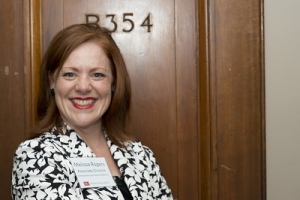 Melissa Rogers, the Director of the White House Office of Faith-Based and Neighborhood Partnerships
Melissa Rogers, the Director of the White House Office of Faith-Based and Neighborhood Partnerships 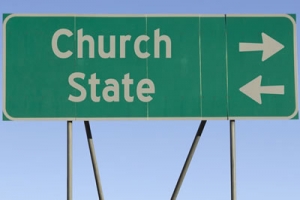 We are asking all SPI coalition members to sign on to the letter linked below.  The deadline to sign on is 
We are asking all SPI coalition members to sign on to the letter linked below.  The deadline to sign on is  nationwide vaccination policy and repeal the non-medical vaccination exemptions which currently exist in 48 states.  Philosophical and religious exemptions are given subjectively to a person who claims a sincere religious belief to be exempt from vaccinations and or from vaccinating their child, reducing the overall efficacy of vaccinations and putting entire communities at risk of preventable diseases.
nationwide vaccination policy and repeal the non-medical vaccination exemptions which currently exist in 48 states.  Philosophical and religious exemptions are given subjectively to a person who claims a sincere religious belief to be exempt from vaccinations and or from vaccinating their child, reducing the overall efficacy of vaccinations and putting entire communities at risk of preventable diseases. 10 percent
10 percent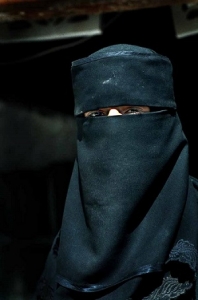 ISIS extremists in Iraq and Syria declare that Islamic scripture justifies their taking of refugee women as sex slaves. Men in some Muslim societies cite their religion in defending ÔÇ£honor killingsÔÇØ of women. In the West, many commentators proclaim Islam inherently sexist, and some governments ban the veils traditionally worn by many Muslim women. Amid the turmoil, a growing cohort of female Islamic scholars says Muslim women are marginalized not by the Quran but by patriarchal cultural practices and interpretations of their faith.
ISIS extremists in Iraq and Syria declare that Islamic scripture justifies their taking of refugee women as sex slaves. Men in some Muslim societies cite their religion in defending ÔÇ£honor killingsÔÇØ of women. In the West, many commentators proclaim Islam inherently sexist, and some governments ban the veils traditionally worn by many Muslim women. Amid the turmoil, a growing cohort of female Islamic scholars says Muslim women are marginalized not by the Quran but by patriarchal cultural practices and interpretations of their faith.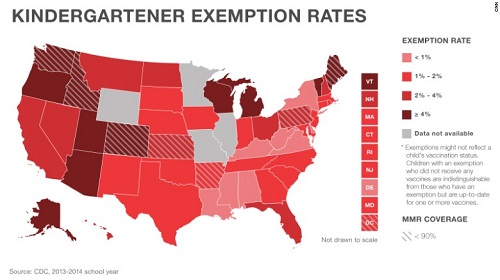
 The final debate against vaccination is religious objection, but just how many mainstream religions actually discourage vaccines?┬á One.┬á The Dutch Reformed Church to be exact.┬á Since the 1800ÔÇÖs, this church has refused vaccines beginning with smallpox.┬á This was mostly due to early observed adverse effects of vaccines from that era…to state the obvious, medicine has since made incredible advances.┬á This was also the era when many women died after childbirth from infection because doctors did not yet
The final debate against vaccination is religious objection, but just how many mainstream religions actually discourage vaccines?┬á One.┬á The Dutch Reformed Church to be exact.┬á Since the 1800ÔÇÖs, this church has refused vaccines beginning with smallpox.┬á This was mostly due to early observed adverse effects of vaccines from that era…to state the obvious, medicine has since made incredible advances.┬á This was also the era when many women died after childbirth from infection because doctors did not yet 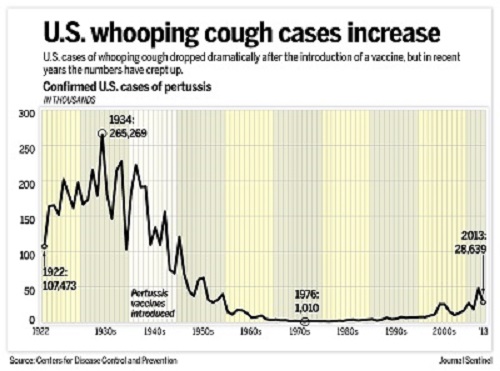 In 2013, a
In 2013, a 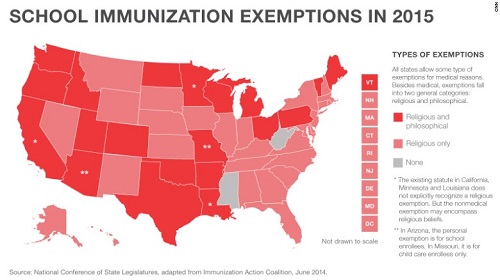 Regarding the broad spectrum of Christian religions, none in the study expressed any dogmatic law against vaccination.  Roman Catholicism, Eastern Orthodox and Oriental Orthodox Churches, Amish, Anglican, Baptist, the Church of Jesus Christ of Latter-day Saints (LDS), Congregational, Episcopalian, Lutheran, Methodist (including African Methodist Episcopal), Pentecostal, Presbyterian, and Seventh-Day Adventist Church. Roman Catholics and some other denominations have expressed concerns about the aborted fetal tissues used in manufacturing some vaccines, although this concern has
Regarding the broad spectrum of Christian religions, none in the study expressed any dogmatic law against vaccination.  Roman Catholicism, Eastern Orthodox and Oriental Orthodox Churches, Amish, Anglican, Baptist, the Church of Jesus Christ of Latter-day Saints (LDS), Congregational, Episcopalian, Lutheran, Methodist (including African Methodist Episcopal), Pentecostal, Presbyterian, and Seventh-Day Adventist Church. Roman Catholics and some other denominations have expressed concerns about the aborted fetal tissues used in manufacturing some vaccines, although this concern has 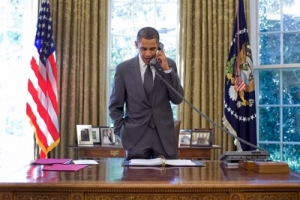 President Obama will phone the Army veteran who tried to save lives during the mass shooting on an Oregon college campus, according to a new report.
President Obama will phone the Army veteran who tried to save lives during the mass shooting on an Oregon college campus, according to a new report.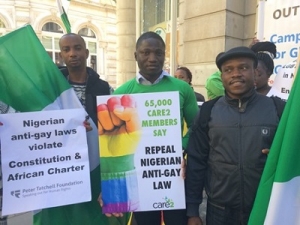 Nearly 100 people rallied outside the Nigerian High Commission in London on 30 September. They handed in a petition with over 65,000 signatures, urging Nigerian President Muhammadu Buhari to repeal of all NigeriaÔÇÖs anti-LGBTI laws.┬áThe embassy refused to take the petition, instead locking the doors.
Nearly 100 people rallied outside the Nigerian High Commission in London on 30 September. They handed in a petition with over 65,000 signatures, urging Nigerian President Muhammadu Buhari to repeal of all NigeriaÔÇÖs anti-LGBTI laws.┬áThe embassy refused to take the petition, instead locking the doors.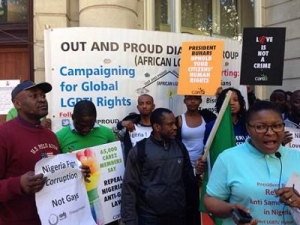 clear that being gay or transgender is a sin, a sentiment that is fueled by homophobic messages from faith communities, political leaders, families, and schools. I took these messages in, identified with them, and carried the shame of being a lesbian woman in Nigeria. I was arrested, tortured and extorted by the Nigerian Police. I demand a repeal of this toxic law,” she said.
clear that being gay or transgender is a sin, a sentiment that is fueled by homophobic messages from faith communities, political leaders, families, and schools. I took these messages in, identified with them, and carried the shame of being a lesbian woman in Nigeria. I was arrested, tortured and extorted by the Nigerian Police. I demand a repeal of this toxic law,” she said.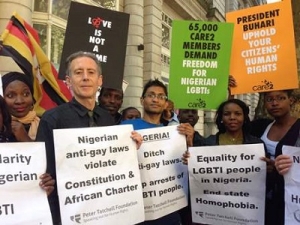 ÔÇ£More recently, a draconian new anti-LGBTI law – the Same Sex Marriage (Prohibition) Bill – was signed into law in January 2014. It is one of the harshest and most punitive of the many laws in nearly 80 countries that criminalize Lesbian, Gay, Bisexual, Transgender and Intersex (LGBTI) people.
ÔÇ£More recently, a draconian new anti-LGBTI law – the Same Sex Marriage (Prohibition) Bill – was signed into law in January 2014. It is one of the harshest and most punitive of the many laws in nearly 80 countries that criminalize Lesbian, Gay, Bisexual, Transgender and Intersex (LGBTI) people.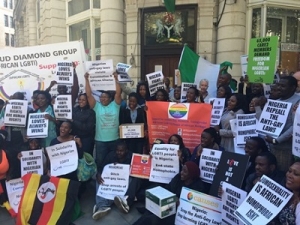 Further information:
Further information: There┬áare many reasons why skeptics might find fault with the 17 Sustainable Development Goals, along with 169 associated targets, which the leaders of the world (including the pope) will adopt, with some fanfare, in New York this week. One problem, as a colleague has written, is that they are simply too numerous. As the French statesman Georges Clemenceau expostulated in 1919, when presented with Woodrow Wilson’s “14 points” for a new world order, “le bon Dieu n’en a eu que dix”, ten
There┬áare many reasons why skeptics might find fault with the 17 Sustainable Development Goals, along with 169 associated targets, which the leaders of the world (including the pope) will adopt, with some fanfare, in New York this week. One problem, as a colleague has written, is that they are simply too numerous. As the French statesman Georges Clemenceau expostulated in 1919, when presented with Woodrow Wilson’s “14 points” for a new world order, “le bon Dieu n’en a eu que dix”, ten  SPI would like to mention Coalition The Evolution Institute, especially Jerry Lieberman who was featured alongside SPI Fellow David Sloan Wilson last week at the panel on Evolution in Oslo, Norway. ┬áUnable to make the trip? Video of the panel is available
SPI would like to mention Coalition The Evolution Institute, especially Jerry Lieberman who was featured alongside SPI Fellow David Sloan Wilson last week at the panel on Evolution in Oslo, Norway.  Unable to make the trip? Video of the panel is available 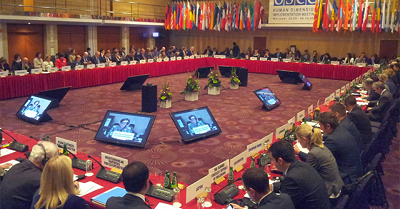 . Making two formal contributions to OSCE human rights conference in Warsaw, highlighting religious discrimination against atheists and members of minority faiths in Ireland and throughout the OSCE.
. Making two formal contributions to OSCE human rights conference in Warsaw, highlighting religious discrimination against atheists and members of minority faiths in Ireland and throughout the OSCE.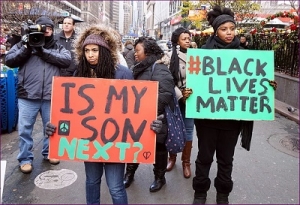
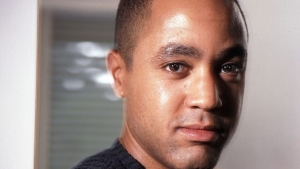 SPI Fellow John McWhorter published a piece on The Daily Beast this week titled
SPI Fellow John McWhorter published a piece on The Daily Beast this week titled Why are these faith-based organizations being used?  Think of these organizations as independent contractors, the government has farmed out various needs and services to these contractors instead of keeping them in house.  Now, extend this metaphor into something like construction.  Anyone who has built a house or had any type of major repair done to their home will have asked themselves this question: will the lowest bidding contractor do the best job?
Why are these faith-based organizations being used?┬á Think of these organizations as independent contractors, the government has farmed out various needs and services to these contractors instead of keeping them in house.┬á Now, extend this metaphor into something like construction.┬á Anyone who has built a house or had any type of major repair done to their home will have asked themselves this question: will the lowest bidding contractor do the best job? happened,┬á stories such as NoahÔÇÖs Ark and Genesis are HISTORICAL fact, climate change/collapse is a lie or not caused by humans, psychology comes from the soul and that the Bible is a historical text.┬á In 11 states, these lies are being funded by taxpayer dollars.┬á US Supreme Court ruled in 2002 that school vouchers were legal even when supporting religious education
happened,┬á stories such as NoahÔÇÖs Ark and Genesis are HISTORICAL fact, climate change/collapse is a lie or not caused by humans, psychology comes from the soul and that the Bible is a historical text.┬á In 11 states, these lies are being funded by taxpayer dollars.┬á US Supreme Court ruled in 2002 that school vouchers were legal even when supporting religious education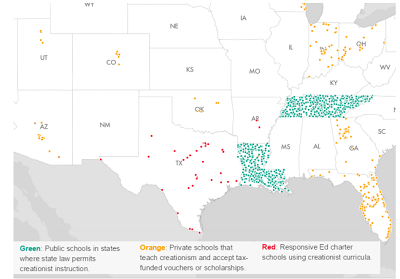 Why should we care?┬á After all, the average school year is 180 days, so even 2 days of creationist instruction would only make up 1% of a studentÔÇÖs class-time.┬á The issue is that tax payers come from a diverse range of religions or have no religion at all.┬á The
Why should we care?┬á After all, the average school year is 180 days, so even 2 days of creationist instruction would only make up 1% of a studentÔÇÖs class-time.┬á The issue is that tax payers come from a diverse range of religions or have no religion at all.┬á The 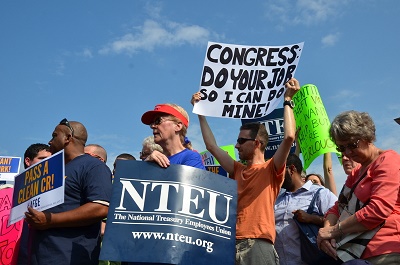 Senate Majority Leader
Senate Majority Leader 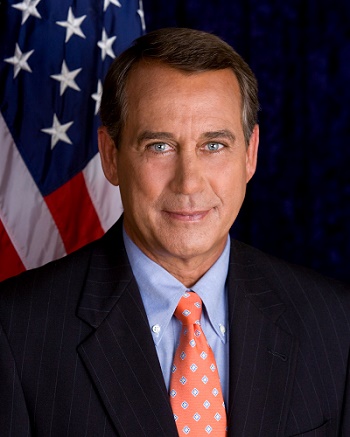  Speaker Boehner Leaving Congress Next Month. Speaker of the House
 Speaker Boehner Leaving Congress Next Month. Speaker of the House 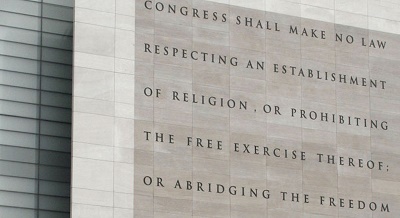
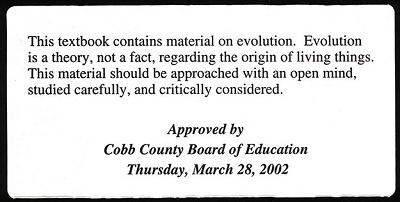 Alabama board of education voted to approve a new set of┬áscience standards on September 10, 2015, in which evolution was described as “substantiated with much direct and indirect evidence,”┬áthe question arose: what will become of the evolution disclaimer in┬áAlabama’s textbooks?
Alabama board of education voted to approve a new set of┬áscience standards on September 10, 2015, in which evolution was described as “substantiated with much direct and indirect evidence,”┬áthe question arose: what will become of the evolution disclaimer in┬áAlabama’s textbooks?